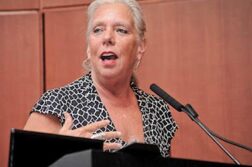Jane Rule, who died of cancer on November 27, 2007, at her home in Galiano Island off the coast of British Columbia, will undoubtedly be best remembered for her first published novel, 1964’s Desert of the Heart. The book was pioneering not only for its lesbian content but for the “happy ending” it accorded the central characters. The film Desert Hearts, based Rule’s novel, was made more than twenty years after the novel’s publication and did much to bring Rule’s name to prominence for a new generation of readers.
Books by Jane Rule:
After the Fire, 1989
Against the Season, 1971
Contract with the World, 1980
The Desert of the Heart, 1964
A Hot-Eyed Moderate, 1985
Inland Passage and Other Stories, 1985
Lesbian Images, 1975
Memory Board, 1987
Outlander: Short Stories and Essays, 1981
Theme for Diverse Instruments: Stories, 1975
This Is Not for You, 1970
The Young in One Another’s Arms, 1977





